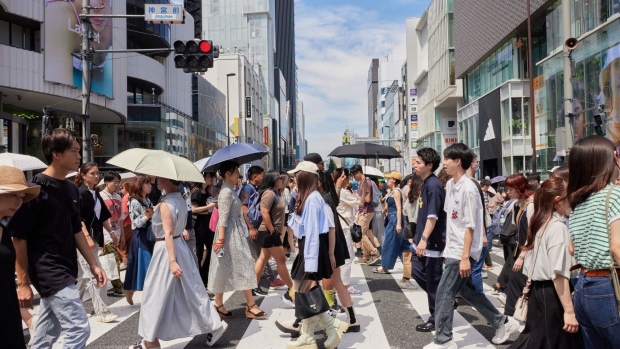Aug 14, 2023
Japan’s Economy Expands More Than Expected on Export Gains
, Bloomberg News

(Bloomberg) -- Japan’s economy expanded at a much faster clip than forecast, as a surge in exports more than offset weaker-than-expected results for both business investment and private consumption.
Gross domestic product grew at an annualized pace of 6% in the second quarter, marking the strongest growth since the last quarter of 2020, Cabinet Office data showed Tuesday. The figure exceeded economists’ forecast of 2.9% growth. Net exports contributed 1.8 percentage points to the expansion versus consensus estimates of 0.9 point.
Tuesday’s data add to signs that the world’s third largest economy continues to recover from the pandemic. The size of the economy grew to 560.7 trillion yen ($3.85 trillion), the biggest on record, surpassing its pre-pandemic peak. The result was consistent with views at the International Monetary Fund, which recently bumped up its 2023 growth outlook for Japan to 1.4%.
Still, the strong result came with caveats, as much of the growth came from external demand.
“I can’t say all is good when I look at the content. Only net exports beat estimates a lot while consumption weakened and it remains below the level prior to the pandemic,” said Taro Saito, head of economic research at NLI Research Institute. “I can say that this won’t be a factor to move the BOJ toward policy normalization.”
What Bloomberg Economics Says...
“The only problem — it was all export driven and masked rocky conditions in domestic demand. The drop in consumption, despite a tailwind from this year’s reopening, reflects the impact of wages lagging far behind cost-push inflation.”
— Taro Kimura, economist
For the full report, click here.
Trade data showed that exports remained resilient over the last quarter, led by auto shipments to the US and Europe. It’s unclear if that boost will be sustained, as economists see headwinds on the horizon in the US, China and Europe.
Rising numbers of inbound travelers, whose contribution is also factored into the net exports component of GDP, provided a big economic boost after authorities lifted border controls at the end of April. The number of foreign visitors has recovered to more than 70% of pre-pandemic levels as of June, according to the Japan National Tourism Organization. Data for July are due Wednesday.
Tourism spending is expected to provide a bigger boost from August after China last week lifted a ban on group travel. Chinese tourists accounted for more than a third of the more than 1 trillion yen in such outlays in 2019.
“Compared with the January-March period, the improvement seen in consumption driven by increased activity has weakened,” said Harumi Taguchi, principal economist at S&P Global Market Intelligence. “Rising prices are increasingly causing consumers to hold off on buying items.”
Capital spending by businesses was flat, versus forecasts of a 0.4% increase, while private consumption, which accounts for more than 50% of total GDP, unexpectedly declined by 0.5%.
Those signs of domestic weakness may quell market speculation that the Bank of Japan will seize the strong headline number as justification for debating whether to mull a move away from its massive stimulus, as Governor Kazuo Ueda has cited uncertainties in overseas markets in recent comments.
In its latest Outlook report, the BOJ noted that external demand may flag in the months ahead, saying, “Exports and production are projected to be affected by the slowdown in the pace of recovery in overseas economies resulting mainly from the impact of global inflationary pressure and policy interest rate hikes by central banks.”
Still, the result may be welcome news to Prime Minister Fumio Kishida as he looks for positive developments to reverse a recent dip in his approval ratings in nationwide polls. His popularity suffered after the rollout of new ID card for citizens was beset by problems.
The weakening of the yen is weighing on domestic demand as it drives up costs for imported goods. “Import prices are also rising due to the weak yen and other factors, putting downward pressure on imports,” said Shumpei Goto, researcher at The Japan Research Institute.
That impact may linger as the yen slid Tuesday to its weakest versus the dollar since November.
(Adds details from the report, economists’ commentary)
©2023 Bloomberg L.P.






